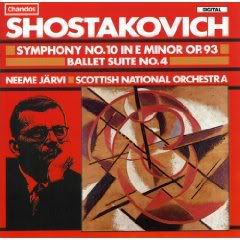I don't know if the suite was written for a particular ballet or simply a use of the form to compose spontaneously. I tend to think the latter, since there is nothing else mentioned in the CD booklet.
Well...heck...why not? Let's go ahead and conjure up a stage production for this wonderful music. Dimitri shouldn't mind. He's dead. And purists can just stew in their own aesthetic juices.
The Ballet is for me a song of Russia, a sweeping parade of images. Yes, I can visualize a stage, with colorfully costumed dancers. They are embodiments of the land, moving (in both senses) depictions of soulful essence rising from soil and stream.
I. Introduction [Variation] (5:52)
To set the scene, imagine an idyllic forest – tall, fake monumental trees, shadows deep and dark (we'll need a good lighting technician), a faux-glittering stream babbling implicitly. In a clearing, sits our Pagan group...a fur-clothed assemblage borrowed from Stravinsky's Le Sacre du Printemps. No borders yet divide what will become Russia from Ukraine.
Alarm, confusion breaks out! A scurrying of the folk, as distant horns herald the arrival of invaders from the Eastern Steppes – Magyars, Huns, and the hawk-eyed Cossacks! Enter stage right: horses bearing the wild, hat-plumed encroachers. Things will never be the same.
Centuries roll, and that which was altered is now a new normality. The complexion of the people has changed, as different arteries have contributed their bloodlines to the changed land. A flute sends trilling bird-notes across the dawn-steamed valleys, into the pine-textured hillsides, over the wild flower meadows. Towns are rising. The folk are laughing. Loves are blooming.
But very deep in the forest, a tribe is untouched – that group who anciently survived, owing to a sacrificial dance. This bloodline still flows with the minerals and fragrance of hidden brooks. And do you see her? That face is in the music. Beauty to steal the breath. She has reappeared over millennial cycles. In the background -- while time is marching down vodka roads (envision a procession of peasants) and culture is advancing (now, the carts and noise of merchants) – she swirls in rhythmic glissades, bourréees, pirouettes, and sissonnes to the movement of stars and moons. Our gown-clad human fairy bears the intelligence of the woods into the future, and her gestures touch us in places we knew not were there. Time will also subsume her tissues into different heredity, but the magical Slavic essence will remain evergreen.
II. Waltz (3:32)
The circus has arrived in Moscow! Do you see the large tents slowly going up? The glowing night arrives, with fireworks exploding over the large barren field, as crowds stream into venues of thrilling display. Dancing bears, clowns, acrobats to amaze young and old! Smiles abound, and couples hold hands. Tomorrow will bring the audience back to drudgery and the conventions of society's strata. But tonight! Tonight, dreams live and breathe and tumble on the warm, jestering breezes that waft up into the stands.
III. Scherzo (3:29)
Napoleon is quickly refuted in the mini-battle and retreat on stage (canons and smoke, hectic skirmish and valiant charge). Pride is restored, as seen in the celebratory chorus dance. But the friction of encounter has left its traces. By osmosis, the Mother Land is absorbing things of the West. Ideas abound. Screeds proclaim. Serfs freed. Everywhere, a new energy, propelling the land toward a rendezvous with scoundrels. Toward dogma twisted from a thoughtful source. But how do you stop a run-away locomotive fueled by passion and sincere hope?
The music ends. The audience sits in silence. A final curtain is drawn to reveal the river mist once again drifting through glade and dell. And there she is: that wondrous daughter of larger Russia. Moving alone to music only she hears. Taking the ancient soul of this world with her into other realms, new mysteries of time.
Admittedly, a time paradox is involved here: how to stage all this action in such a short piece of music. In my head, time is very fluid and flexible.
Here's a Youtube of the Introduction by the Russian Philharmonic Orchestra, conducted by Dimitri Yablonsky:
Ballet Intro
And here's the CD:





No comments:
Post a Comment